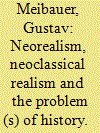|
|
|
Sort Order |
|
|
|
Items / Page
|
|
|
|
|
|
|
| Srl | Item |
| 1 |
ID:
145951


|
|
|
|
|
| Summary/Abstract |
Buffer zones as a concept have a long history. Despite their frequent occurrence in international relations past and present, however, they have been treated in passing by scholars and policymakers alike, and then usually from a purely historical perspective. Their importance in conflict management, third-party intervention and power politics are not adequately mirrored in scholarly research. This article seeks to remedy this lapse by re-introducing the buffer zone as a tool of international conflict management in a new and systematic fashion. In this article, we survey buffer zones, their conceptual roots and characteristics, and illustrate our theoretical findings with an array of different examples—predominantly from the twentieth and twenty-first centuries. In so doing, we make three fundamental arguments about buffer zones.
|
|
|
|
|
|
|
|
|
|
|
|
|
|
|
|
| 2 |
ID:
172423


|
|
|
|
|
| Summary/Abstract |
Ideational variables have frequently been employed in positivist-minded and materialist analyses of state behaviour. Almost inevitably, because of these commitments, such studies run into theoretical challenges relating to the use of ideas. In this article, I suggest that integrating ideational factors in positivist and materialist approaches to state behaviour requires: (1) distinguishing conceptually between interests and ideation as well as between individual beliefs and social ideas; and (2) addressing challenges of operationalisation and measurability. To that end, I employ neoclassical realism as a case study. I argue that a re-conceptualisation of ideas as externalised individual beliefs employed in political deliberation allows neoclassical realists to focus on how ideas and ideational competition intervene in the transmission belt from materially given interests to foreign policy choice. At the same time, it more clearly operationalises ideas as identifiable in language and communication. I suggest this reconceptualisation, while consistent with realist paradigmatic assumptions, need not be limited to neoclassical realism. Instead, transposed to different paradigms, it would similarly allow positivist-minded constructivists and institutionalists to avoid a conceptually and methodologically awkward equation of different ideational factors.
|
|
|
|
|
|
|
|
|
|
|
|
|
|
|
|
| 3 |
ID:
191961


|
|
|
|
|
| Summary/Abstract |
Following scholarship on IR’s ‘historical turn’ as well as on neorealism and neoclassical realism, this article finds fault particularly in neorealism’s implicit reliance on the historically contingent but incompletely conceptualised transmission of systemic factors into state behaviour. Instead, it suggests that neoclassical realism (NCR) is well-suited to leveraging ‘history’ in systematic and general explanation. This article interrogates two routes towards a historically sensitive NCR (intervening variables and structural modifiers), and how they enable different operationalisations of ‘history’ as a sequence of events, cognitive tool or collective narrative. The first route suggests history underpins concepts and variables currently used by neoclassical realists. Here, history is more easily operationalised and allows a clearer view at learning and emulation processes. It is also more clearly scoped, and therefore less ‘costly’ in terms of paradigmatic distinctiveness. The second route, in which history modifies structural incentives and constraints, is more theoretically challenging especially in terms of differentiating NCR from constructivist approaches, but lends itself to theorising systemic change. Both routes provide fruitful avenues for realist theorising, can serve to emancipate NCR from neorealism in IR and foster cross-paradigmatic dialog. Examining how ‘history’ can be leveraged in realism allows interrogating how other ‘mainstream’, positivist approaches can and should leverage historical contingency, context and evidence to explain international processes and outcomes.
|
|
|
|
|
|
|
|
|
|
|
|
|
|
|
|
|
|
|
|
|